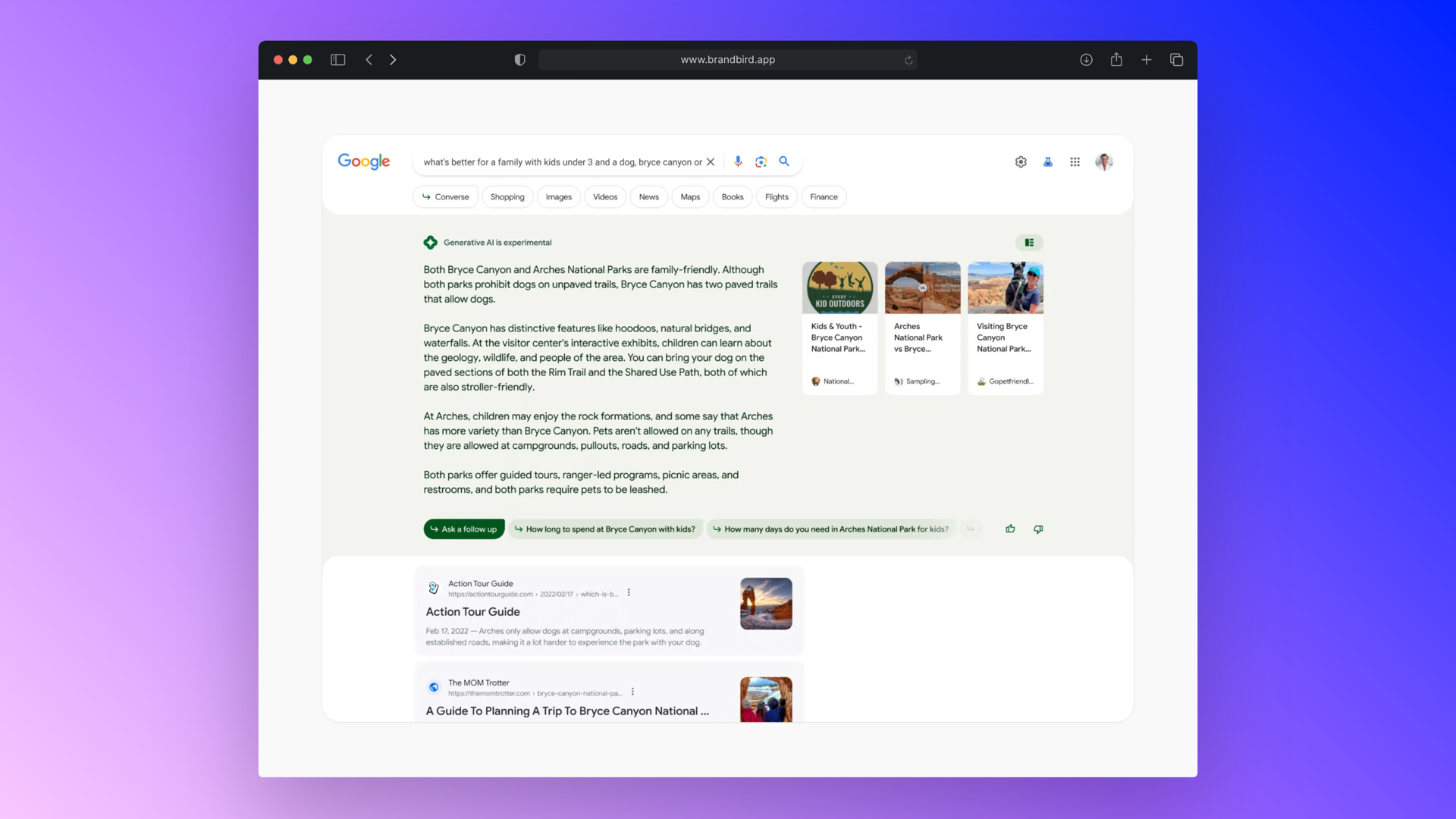Google's New AI Integration and its Impact on SEO
Vincent Haywood • 2023-05-12
In this post we explore the major implications of Google's new AI integration for search engine optimisation (SEO)
On May 10th, Google revealed its plan to revolutionise the search experience with AI-generated answers. This announcement has left many SEO professionals feeling anxious about the ramifications for their work.
In this post we explore the major implications of Google's new AI integration for search engine optimisation (SEO). By understanding the impact of Google's AI integration on SEO, you can ensure your website remains up-to-date and competitive.
To get started, watch the full presentation from Google I/O 2023 where they announced Google's AI integration
Google's new AI integration is bringing a revolutionary change to the way search queries are processed. By leveraging machine learning algorithms and natural language processing techniques, Google is now able to better understand the context behind user queries and provide more accurate results. This means that websites need to ensure they are optimised for the new AI algorithms, as well as traditional SEO techniques.
Understanding Google's Generative Experience (SGE)
Google's AI integration into search is referred to as Search Generative Experience (SGE). This new technology has been designed to provide users with a better experience by offering AI-powered snapshots that quickly give an overview of what they are searching for. These AI results appear at the top of the page, giving users instant access to answers, which can reduce the need to visit websites. This means that websites may be pushed further down the search results page, and this could have an effect on website traffic and revenue.
More details here: Supercharging Search with generative AI
The Downside of SGE for Website Owners
For website owners and affiliate marketers, Google's new AI integration may seem like a drawback. The AI-powered snapshot provides a list of products that is linked directly to e-commerce stores, bypassing any potential revenue from affiliate marketing links. Additionally, the conversational mode allows users to refine their search with follow-up questions, potentially making users less likely to visit websites for more information. In short, Google's AI technology may have a negative effect on SEO and website traffic.
Why Websites Will Still Get Traffic
It may seem like a difficult task, but Google has made it clear that they still value human-written content and the need for AI to learn from this. If websites stop producing content as a result of reduced traffic, then the AI would be lacking in learning resources.
Additionally, Google has updated their product reviews algorithm and guidelines, demonstrating the fact that people often prefer human insight when making purchase decisions.
Furthermore, a large portion of Google's annual revenue is generated from search result ads and the Google Display Network. The former places business websites at the top of a Google search while the latter relies on high-traffic sites. If these websites stopped receiving traffic, it could have a significant negative impact on Google's ad revenue.
Lastly, certain search queries will not be provided AI snapshots due to users preferring the human touch. This means that there are still opportunities for website owners to get their content in front of audiences and generate traffic.
Overall, Google's new AI integration does not spell the end for website traffic. People still value human insight and content, so businesses can continue to reap the benefits of SEO if they focus on producing quality material.
Sign up for Generative AI Search Using Labs
To get started with Google's new AI Search, you need to meet a couple of criteria:
- You need to have signed up for Labs.
- You need to be a Google One Premium (2+ TB) subscriber.
These limitations are temporary and could change in the future. Even if you're not a Google One Premium subscriber, it's recommended that you sign up for the free Labs as that restriction might be lifted eventually.
Once you're signed up for Labs, you can access the AI Search feature by following these steps:
- In Google Search – on mobile or web – look for the Labs icon. Click or tap it.
- Look for the SGE (Search Generative Experience) card. Tap or click the toggle so it's set to "on."
- Click or tap on "I agree."
After completing these steps, you should have access to Google's new AI Generative Search Experience. The feature is designed to be more conversational and provide more dynamic results in response to your queries. If you're not a Google One subscriber, don't worry. The SGE feature will likely be available to others who have signed up for the Lab in preview, though it might take some time.
The Silver Lining - AI in Content Creation
While website traffic may be impacted to some degree, Google's move to integrate AI opens up an exciting possibility: leveraging AI to significantly boost content production. This means that SEO professionals and website owners now have the opportunity to use AI to enhance their content production process, from research and fact-checking to SEO optimisation.
Google's SGE signals a major shift in the realm of SEO. While it might initially appear to be a challenge for website owners, it is also an opportunity for those willing to adapt and leverage the power of AI in content creation. This is a clear testament to the dynamism of SEO, and the need for SEO professionals to stay abreast of changes and continuously innovate.



